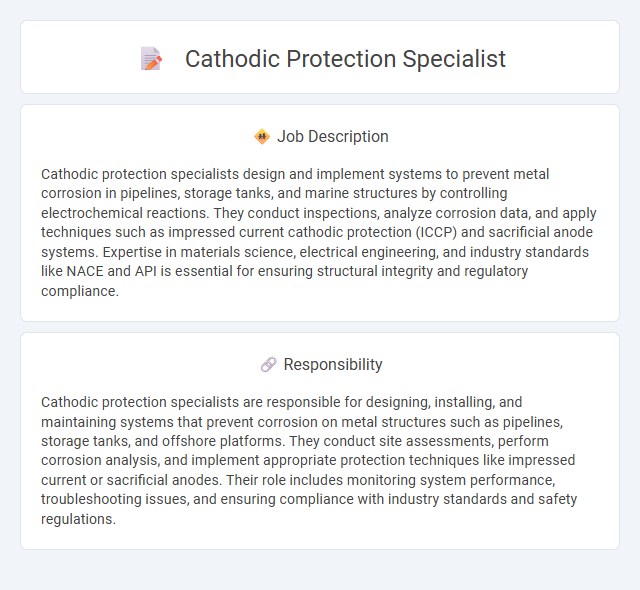
Cathodic protection specialists design and implement systems to prevent metal corrosion in pipelines, storage tanks, and marine structures by controlling electrochemical reactions. They conduct inspections, analyze corrosion data, and apply techniques such as impressed current cathodic protection (ICCP) and sacrificial anode systems. Expertise in materials science, electrical engineering, and industry standards like NACE and API is essential for ensuring structural integrity and regulatory compliance.
Individuals with a strong technical background and an aptitude for problem-solving may find the role of a cathodic protection specialist suitable, especially if they are comfortable working in industrial environments and handling complex corrosion-related challenges. Those who prefer hands-on tasks and have a keen interest in materials science and engineering principles might likely thrive in this position. However, people who are averse to working in potentially harsh outdoor conditions or who struggle with detail-oriented diagnostics may find the job less compatible with their preferences.
Qualification
A cathodic protection specialist requires extensive knowledge of electrochemical corrosion processes and expertise in designing and implementing corrosion control systems. Proficiency in using testing equipment such as reference electrodes, potential measurements, and data interpretation is essential for monitoring and maintaining protective systems. A bachelor's degree in electrical, mechanical, or corrosion engineering, combined with certifications like NACE CP1 or CP2, significantly enhances job qualifications and professional credibility.
Responsibility
Cathodic protection specialists are responsible for designing, installing, and maintaining systems that prevent corrosion on metal structures such as pipelines, storage tanks, and offshore platforms. They conduct site assessments, perform corrosion analysis, and implement appropriate protection techniques like impressed current or sacrificial anodes. Their role includes monitoring system performance, troubleshooting issues, and ensuring compliance with industry standards and safety regulations.
Benefit
Cathodic protection specialists likely provide critical benefits by extending the lifespan of metal structures through corrosion prevention, reducing maintenance costs and downtime. Their expertise probably enhances safety by minimizing structural failures caused by corrosion. Companies may also experience improved regulatory compliance and environmental protection as a result of their specialized interventions.
Challenge
Challenges in a Cathodic Protection Specialist role often involve diagnosing complex corrosion problems in diverse environments, requiring specialized knowledge of electrochemical principles. There is a probability of encountering unpredictable field conditions that demand innovative adaptation of protection techniques. Specialists may frequently face the task of balancing cost-effectiveness with stringent safety and regulatory compliance standards.
Career Advancement
A Cathodic Protection Specialist advances their career by gaining expertise in corrosion control techniques and mastering the design and installation of cathodic protection systems for pipelines, storage tanks, and marine structures. Progression opportunities include roles such as Senior Corrosion Engineer, Project Manager, or Technical Consultant, often requiring certifications like NACE CP2 or API RP 651. Continuous professional development through industry seminars and advanced training enhances job prospects and leadership potential within the petroleum, maritime, and infrastructure sectors.
 kuljobs.com
kuljobs.com